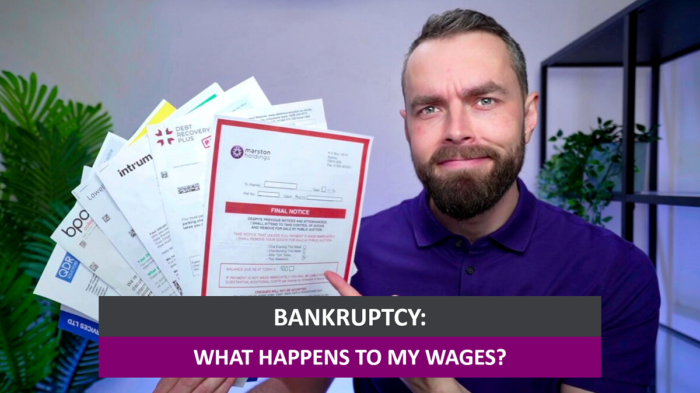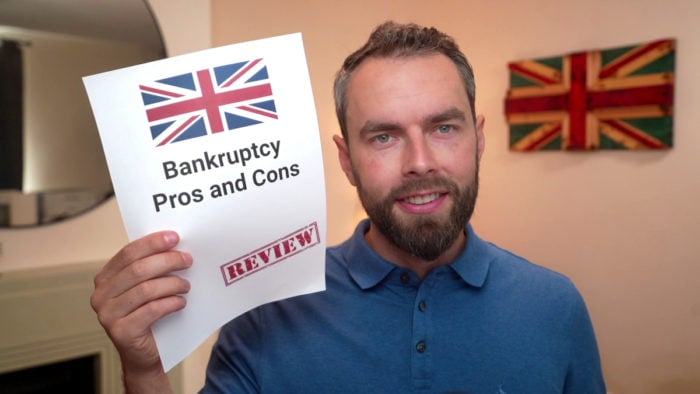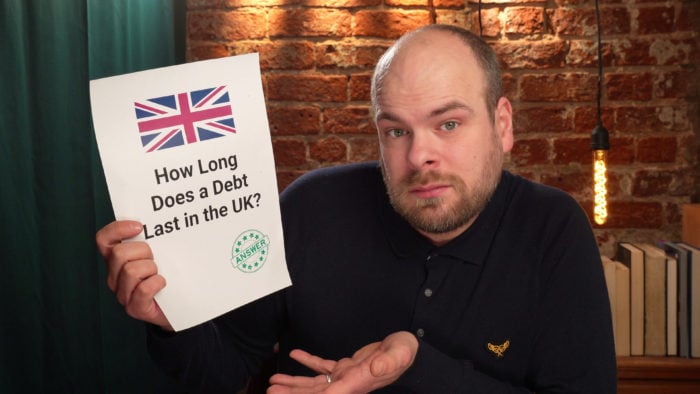If I Go Bankrupt, What Happens to My Wages?
For free & impartial money advice you can visit MoneyHelper. We work with The Debt Advice Service who provide information about your options. This isn’t a full fact-find, some debt solutions may not be suitable in all circumstances, ongoing fees might apply & your credit rating may be affected.

For free & impartial money advice you can visit MoneyHelper. We work with The Debt Advice Service who provide information about your options. This isn’t a full fact-find, some debt solutions may not be suitable in all circumstances, ongoing fees might apply & your credit rating may be affected.
Are you finding it hard to pay your debts and considering bankruptcy? You are not on your own. Each month, over 170,000 people visit our website seeking advice on how to handle debt.
In this guide, we’ll explain:
- What bankruptcy means
- How you become bankrupt
- If it’s the right choice for you
- How to apply for bankruptcy and what it costs
- How bankruptcy affects your life and credit record
In 2021, Citizens Advice helped approximately 280,000 individuals in England and Wales with debt, emphasizing the escalating issue of personal debt.1
Our team knows how hard this situation can be because some of us have also experienced the burden of debt. With our experience, we’ll help you understand your options.
Does bankruptcy clear all debts?
» TAKE ACTION NOW: Fill out the short debt form
Who is the Official Receiver?
Your OR will:
- Assess how much you can afford to pay towards your debts or if you can afford to make any payments at all.
- Inform all of your creditors that you have gone bankrupt.
- Take control of some of your property and assets to help you pay off some of your debts.
- Possibly distribute some of your assets amongst your creditors.
- Inform the London Gazette of your bankruptcy.
- Investigate your finances before and during your bankruptcy period.
Keep in mind that you have a legal duty to cooperate with your OR. This can include anything from filling in a questionnaire, to attending interviews and public examinations, or even going to a creditors’ meeting.
You must stick to any timescales that your OR gives you and you must give them any accurate information that they request.
If you have a change of financial circumstances, your OR must be informed and they may amend the terms of your bankruptcy.
If you do not stick to these terms or do not cooperate with your OR, there are consequences.
- You will be ordered to attend a public examination.
- If you do not attend a public examination, an arrest warrant will be issued.
- A bankruptcy restrictions order will be placed on you.
- Your bankruptcy may end and your creditors can once again chase their debts.
Bankruptcy Comparison
Before declaring yourself bankrupt, it’s worth considering other debt solutions. Here’s a quick table that will help you better understand the differences between them.
| Bankruptcy vs Alternative Solutions | How It Can Help Tackle Debt | Suitable For Individuals… |
|---|---|---|
| Bankruptcy | A formal legal process that writes off most debts but has significant consequences, including potentially losing your home and negatively impacting your credit rating and job prospects. | …with significant debts that cannot realistically pay them off. More severe option with substantial consequences. |
| Debt Relief Order (DRO) | A formal solution that freezes debts for a year, after which they may be written off. | …with a total debt under £20,000, low income, and minimal assets, who cannot afford to pay off their debts. |
| Individual Voluntary Arrangement (IVA) | A formal, legally binding agreement that typically lasts for 5 years and can write off a portion of your debt at the end. Credit rating will be negatively affected. Homeowners can keep their home. | …with a larger amount of debt who can commit to a fixed repayment plan and want to avoid bankruptcy. |
| Debt Management Plan (DMP) | An informal agreement to pay back non-priority debts in a more manageable way, but does not write off any debt. | …seeking a flexible arrangement without legal proceedings. |
| Consolidation Loan | A consolidation loan involves taking out new credit to pay off existing debts. It can simplify payments and potentially reduce interest rates. But, you could also end up paying more interest overall. | .. with multiple debts looking to consolidate into a single payment, usually with a good credit score to obtain favourable terms. |
| Payment Holiday | Payment holidays offer short-term relief by pausing or reducing payments. Payment holidays don’t reduce the total debt amount and are usually for a short duration. | ..with short-term financial difficulties needing temporary relief from debt payments. |
| Equity Release | Equity release involves homeowners releasing equity from their property. It provides a lump sum or additional income by using the home’s value but reduces the property’s equity. | …with debts and want to unlock the value in their home to pay them off, reducing their property’s equity. (Ideally for older homeowners, usually 55+) |
| Informal Negotiation | Informal negotiation is not legally binding and involves negotiating with creditors for better terms. | …with debts and wish to negotiate terms independently and prefer to have a flexible, non-binding arrangement with creditors. |
How a debt solution could help
Some debt solutions can:
- Stop nasty calls from creditors
- Freeze interest and charges
- Reduce your monthly payments
A few debt solutions can even result in writing off some of your debt.
Here’s an example:
Situation
| Monthly income | £2,504 |
| Monthly expenses | £2,345 |
| Total debt | £32,049 |
Monthly debt repayments
| Before | £587 |
| After | £158 |
£429 reduction in monthly payments
If you want to learn what debt solutions are available to you, click the button below to get started.
What happens after bankruptcy?
What happens to my wages after being made bankrupt?
Keep in mind that what you consider an ‘essential living expense’ may not be the same for everyone!
If, for example, you spend £150 every month on cigarettes or tobacco, your OR will almost definitely not view this as an essential living expense and this £150 may be added to your IPA payment.
Thousands have already tackled their debt
Every day our partners, The Debt Advice Service, help people find out whether they can lower their repayments and finally tackle or write off some of their debt.

Natasha
I’d recommend this firm to anyone struggling with debt – my mind has been put to rest, all is getting sorted.
Reviews shown are for The Debt Advice Service.
How does bankruptcy affect your job and future credit?
- Regulated professions – e.g. a job in law or an accountant
- Gambling professions – if you have a job in the gambling industry, such as a casino dealer, your license is revoked but can be reapplied for.
Can I get insurance after bankruptcy?
If you are bankrupt, you will probably find that your insurance policies are cancelled and you are without cover.
You may find that your insurance is cancelled immediately, but in my experience, it is more common for companies to give you around two weeks to pay the instalments for the rest of the year.
If you do not pay any more instalments, your policy will end.
If you renew your insurance during your bankruptcy, your insurer will know about your status as it will appear on your credit file.
You may find that you now have to pay a higher premium.
This is because insurers know that you are more likely to miss a monthly payment because you have previously been bankrupt.
What happens to your bank account when you go bankrupt?
What happens to my pension if I go bankrupt?
In my experience, most people’s pensions will not be affected by bankruptcy.
This is because any savings that are held in a pension fund are not considered an asset for bankruptcy. In almost all circumstances, your OR can’t take away those savings to pay off some of your debts.
You might find that your OR lowers your monthly pension contributions to the minimum amount until your bankruptcy ends.
If you have other savings or investments these will be taken away by your OR, even if you had earmarked them for your retirement.
Keep in mind that the rules are different once you hit retirement age.
If you are able to withdraw your lump sum when you apply for bankruptcy, your application is likely to be refused if it will cover all of your debts.
If your main source of income is your state pension or pension credits, it is very unlikely that your OR can order you to pay anything after your application has been processed.
But if you also have a private pension, you will probably have to use it to pay your debts after your bankruptcy.
The rules on pensions and bankruptcy can be complicated, so don’t hesitate to ask for professional help!
These debt charities and organisations all offer free pension and bankruptcy advice.




